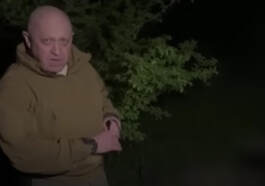 Ever since Yevgeny Prigozhin staged his failed mutiny two months ago, commentators in the West have been suggesting that he should avoid standing near windows in tall buildings and keep an eye on who serves his tea, not to mention who washes his underpants – references to the Kremlin’s favoured methods of disposing of its critics in recent months. When Prigozhin’s plane crashed yesterday near Tver, while travelling between Moscow and St Petersburg, the only surprise was the means of death. At the time of writing, it remains unclear whether the crash was caused by a bomb on board the plane, or whether the aircraft was shot down. Either scenario would implicitly require the authorisation of Russia’s top brass. After years of political assassinations in which Vladimir Putin has denied, shrugged off, or indeed scoffed at, any involvement by the Kremlin, this one could be hard for him to rebuff – although his former advisor Sergei Markov has already attempted to pin the blame on Ukraine. Putin has repeatedly imprisoned, poisoned, shot or defenestrated his political rivals, but the demise of Prigozhin (assuming that he was indeed on the downed plane) marks the first assassination of one of the president’s inner circle. Prigozhin was a former convict who emerged from prison in 1990 to sell hotdogs from a street stall in St Petersburg before expanding into the restaurant business and becoming chief caterer to the Kremlin, earning himself the sobriquet Putin’s Chef. Russia’s annexation of Crimea in 2014 provided the springboard for Prigozhin’s involvement in the military, including major contracts for food and supplies to the Russian army and establishing a band of mercenary soldiers, who have been accused of numerous war crimes in Syria and, of course, more recently in Ukraine. But Prigozhin’s troops fought not only on the battlefield – they have also been mired in allegations of creating a network of fake online accounts to interfere in the US presidential election in 2016. I have written before that Putin has more than a whiff of Joseph Stalin about him, and his (assumed) purging of Prigozhin is yet another reminder of the Soviet past. No member of Stalin’s entourage was ever safe. One whispered word or false rumour of criticism of the leader was enough to prompt a show trial, a forced confession and a bullet in the back of the head. It’s 70 years since Stalin died and – thanks to Putin – his reputation today is being rehabilitated as never before since his denunciation by his successor, Nikita Khrushchev, in the so-called Secret Speech of 1956, when Stalin’s crimes were made public for the first time. Hundreds of modern-day Stalinists gathered in Moscow’s Red Square in March to mark the anniversary of his death, and the state-run news agency RIA Novosti published an article with the headline “Stalin is a weapon in the battle between Russia and the West”, which argued that criticising Stalin is “not just anti-Soviet but is also Russophobic, aimed at dividing and defeating Russia”. It was Stalin who led the Soviet Union through the devastation of World War II. Putin’s rhetoric during his full-scale military invasion of Ukraine harks back repeatedly to the Great Patriotic War, as it is known locally. He equates the war in Ukraine with the fight against Nazi Germany, Ukrainians with fascists. Famously, Putin has stated that the collapse of the Soviet Union was the greatest geopolitical tragedy of the twentieth century, and he has tirelessly aimed his foreign policy at recreating the Soviet era, trying to reimpose control over the former republics as well as attempting to restore Russian ascendancy on the world stage. He brought back the Soviet national anthem and Soviet-era symbols, endeavouring to put back the jigsaw pieces of the past, but making a different shape – one representing the dollar sign rather than the hammer and sickle, with Capitalist bling replacing Communist drudgery. That Communist drudgery came to an end exactly 32 years ago following a previous attempted coup, one used by many commentators to draw parallels with the past during Prigozhin’s mutiny in June. In late August 1991 a group of die-hard Communists, opposed to the reform agenda of President Mikhail Gorbachev and his loss of control over the Soviet republics and former Eastern European vassal states, attempted to seize power. Although the coup failed, it prompted the immediate collapse of the Communist Party of the Soviet Union and, just four months later, the whole country. Ironically, the attempted coup aimed at preserving the Soviet empire precipitated Ukraine’s declaration of independence on 24 August the same year, an anniversary it is marking today without parades or public celebrations out of fear that such events would be targeted by Russian air strikes. Instead, Ukraine is marking the anniversary with a public holiday and a kilometre-long display of destroyed Russian military vehicles on Khreshchatyk, Kyiv’s central boulevard.
0 Comments
|
Keeping stories aliveThis blog aims to discuss historical events relating to the Jewish communities of Ukraine, and of Eastern Europe more widely. As a storyteller, I hope to keep alive stories of the past and remember those who told or experienced them. Like so many others, I am deeply troubled by the war in Ukraine and for the foreseeable future, most articles published here will focus on the war, with an emphasis on parallels with other tumultuous periods in Ukraine's tragic history. Archives
March 2024
Categories
All
|
 RSS Feed
RSS Feed
